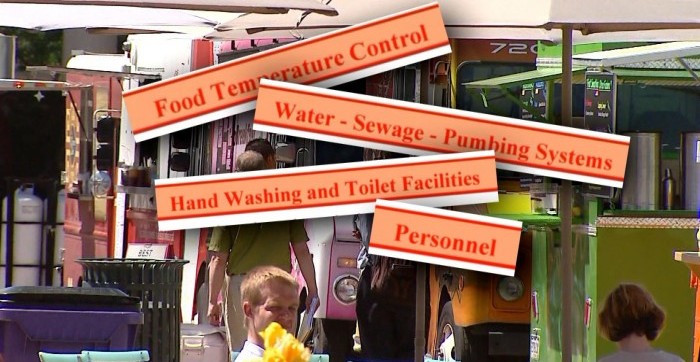Mobile Cuisine is constantly looking to help the mobile food industry. We provide news and information that help not only those who eat from food trucks or carts, but also look to assist the owners and operators of these rolling bistros. A poor rating from a health inspector can keep your business closed for a few days, or even close you permanently. Because of this, in this article we will take a basic look at a common area of consumer concern: food truck health inspections.
The Basics Of Food Truck Health Inspections
The Health Inspection
Health inspections are designed to protect the dining public from food related illnesses that can result if foods are not handled or prepared properly.
The Food and Drug Administration (FDA) is the main governing body for America’s food handling processes. The FDA Food Code outlines specific rules on which state and county health departments model their retail food regulations.
The Health Inspector
Food truck health inspections are conducted by government officials at either the federal, state or local level. The typical health inspector has a college science degree. They are also, a specialist trained in proper food quality, maintenance and preparation practices.
The main tasks of a health inspector include the following:
- Educate mobile restaurateurs and staff on safe food handling and preparation.
- Conduct inspections of food trucks and carts to assure local, state and federal health codes are being followed.
- Issue citations or fines in cases of egregious violation.
- Collect samples, if necessary, to trace the possible sources of a food poisoning outbreak.
- Prepare inspection reports that are available online or on public record at a local office.
Types of Food Truck Health Inspections
Though health regulations and inspection processes can vary from county to county, there are at least three types of health inspections that can occur at your truck or cart.
- Routine Inspection. During this unannounced visit, the inspector looks at all aspects of a food truck or cart to assure compliance with the local food regulations. Everything from employee handwashing practices to trash disposal are looked at during routine inspections.
- Complaint Inspection. Usually a customer has either become sick or filed a complaint about possible unsafe practices. Just because a complaint has been filed does not mean the condition exists. But, be assured the inspector will give your kitchen the white glove treatment and may even take samples of questionable material.
- Follow-Up Inspection. This inspection will occur after a mobile vendor has been given a certain amount of time to correct critical violations. If the inspector says, “I will be back in two weeks to check on your progress”, be sure to take them seriously.
Please Note! This article is a generalization of food truck health inspections and the process involved in them. Please reference your local Food Code or health department for specific governing rules and procedures.
RELATED: Speed Past Your Next Food Truck Health Inspection
The Bottom Line
A common question from the public at large is, “Do food trucks get inspected?” Hopefully after reading this article, they’ll understand that they do. If there is any general information you feel could be added to our list of basic food truck health inspections guide let us know on social media. Twitter | Facebook




